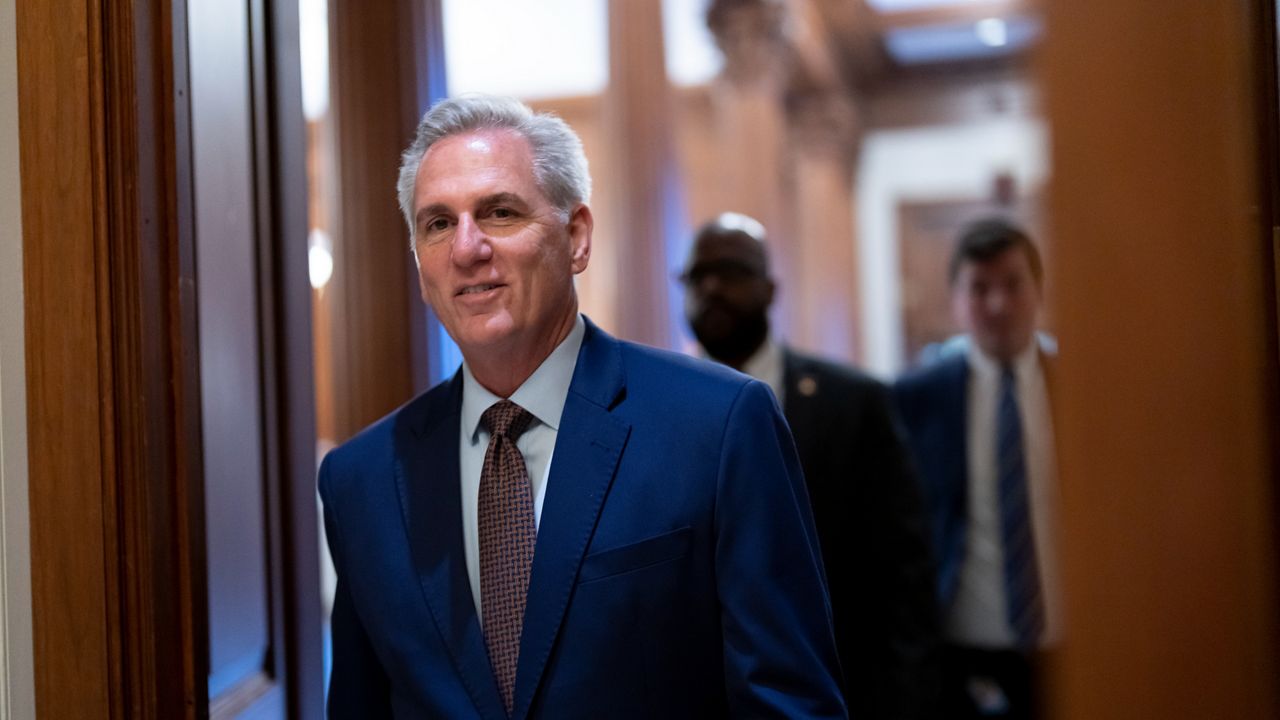Thirty-one House GOP lawmakers and lawmakers-elect signed a letter pledging that they will "do everything in our power to thwart even the smallest legislative and policy efforts" of Senate Republicans who vote to pass the $1.7 trillion full-year government spending bill.
Thirty-one conservatives signed the letter urging Senate Republicans to "use every tool possible to kill this bill," warning that "failure to do so will result in not only legislative and political consequences, but irrevocable consequences for our nation."
News of the letter was first reported by Punchbowl News on Wednesday. Notable signatories include New York Rep. Claudia Tenney, Georgia Rep. Marjorie Taylor Greene, Colorado Rep. Lauren Boebert, Florida Rep. Greg Steube and Texas Reps. Ronny Jackson, Mayra Flores, and Rep.-elect Keith Self.
The letter, released Wednesday, echoes a similar threat in a letter sent by 13 Republican lawmakers and lawmakers-elect earlier this week.
“We are obliged to inform you that if any omnibus passes in the remaining days of this Congress, we will oppose and whip opposition to any legislative priority of those senators who vote for this bill — including the Republican leader,” the letter, released Monday night, reads.
Republicans who signed the first letter include Texas Rep. Chip Roy, North Carolina Rep. Dan Bishop, Florida Rep. Byron Donalds and Florida Rep.-elect Anna Paulina Luna. All of those mentioned signed the second letter as well.
They vowed to “oppose any rule, any consent request, suspension voice vote, or roll call vote of any such Senate bill, and will otherwise do everything in our power to thwart even the smallest legislative and policy efforts of these senators.”
The lawmakers and lawmakers-elect called the bill an “indefensible assault” on fiscal responsibility and the separation of powers, and urged their Senate counterparts to unite to block the bill and punt a long-term spending measure until after January, when Republicans will retake the House.
“Kill this terrible bill or there is no point in pretending we are a united party, and we must prepare for a new political reality,” they wrote.
One major House Republican who did not sign the letter offered their support: Republican Leader Kevin McCarthy, the party’s leading candidate for speaker in January.
“Agreed,” McCarthy wrote on Twitter on Tuesday. “Except no need to whip—when I’m Speaker, their bills will be dead on arrival in the House if this nearly $2T monstrosity is allowed to move forward over our objections and the will of the American people.”
Notably, four of the letter’s signatories — Reps. Matt Gaetz, R-Fla., Ralph Norman, R-S.C., Bob Good, R-Va., and Matt Rosendale, R-Mont. — have stated they will oppose McCarthy’s speakership bid.
Another key McCarthy ally, conservative firebrand Rep. Marjorie Taylor Greene, called on Republican senators to oppose the bill. In a Twitter post, she accused Senate Minority Leader Mitch McConnell, R-Ky., of “giving the Democrats everything they want” by negotiating the bill.
The bill, negotiated between Republicans and Democrats, includes roughly $858 billion in defense funding and $772.5 billion for non-defense spending. One of Congress’ key responsibilities, regardless of which party controls the chamber, is to pass an annual budget.
Lawmakers on both sides have claimed victory in the proceedings.
“This is a strong outcome for Republicans,” Senate GOP Leader Mitch McConnell, R-Ky., said, praising the bill’s defense spending increases.
“It's not everything we would have wanted, of course,” Senate Majority Leader Chuck Schumer, D-N.Y., admitted. “When you're dealing in a bipartisan, bicameral way, you have to sit down and get it done and that means each side has to concede some things.”
“This bipartisan funding bill is an important step forward, bringing both parties together to make progress on critical priorities for our country,” Office of Management and Budget Director Shalanda Young said in a statement. “As with any compromise, neither side got everything it wanted, but this legislation is good for our economy, our competitiveness, and our country, and I urge Congress to send it to the President’s desk without delay.”
Alabama Republican Sen. Richard Shelby, one of the key lawmakers who negotiated on the bill, dismissed McCarthy's rhetoric.
"He’s running for speaker," Shelby, who is retiring at the end of this term, told reporters on Tuesday. "If I were in his shoes, I’d be focused on trying to get to be speaker ... whatever it took, to a point."
The bill contains $45 billion in aid to Ukraine, as well as a bipartisan overhaul of the Electoral Count Act, a direct response to former President Donald Trump’s efforts to overturn the 2020 election results and object to the certification of Joe Biden’s win on Jan. 6, 2021.
“Two years after Jan. 6, the attack on our Capitol remains an indelible stain on our democracy,” Schumer said. “Updating the Electoral Count Act is one of the ways we can prevent another January 6 in the future.”
It also includes more money for Amtrak, an increase in funding for the U.S. Capitol Police and a measure to ban social media app TikTok from federal government devices.
The bill needs the support of 10 Republicans to pass the evenly divided Senate. Lawmakers in the upper chamber are set to hold a vote on the bill Tuesday afternoon.








